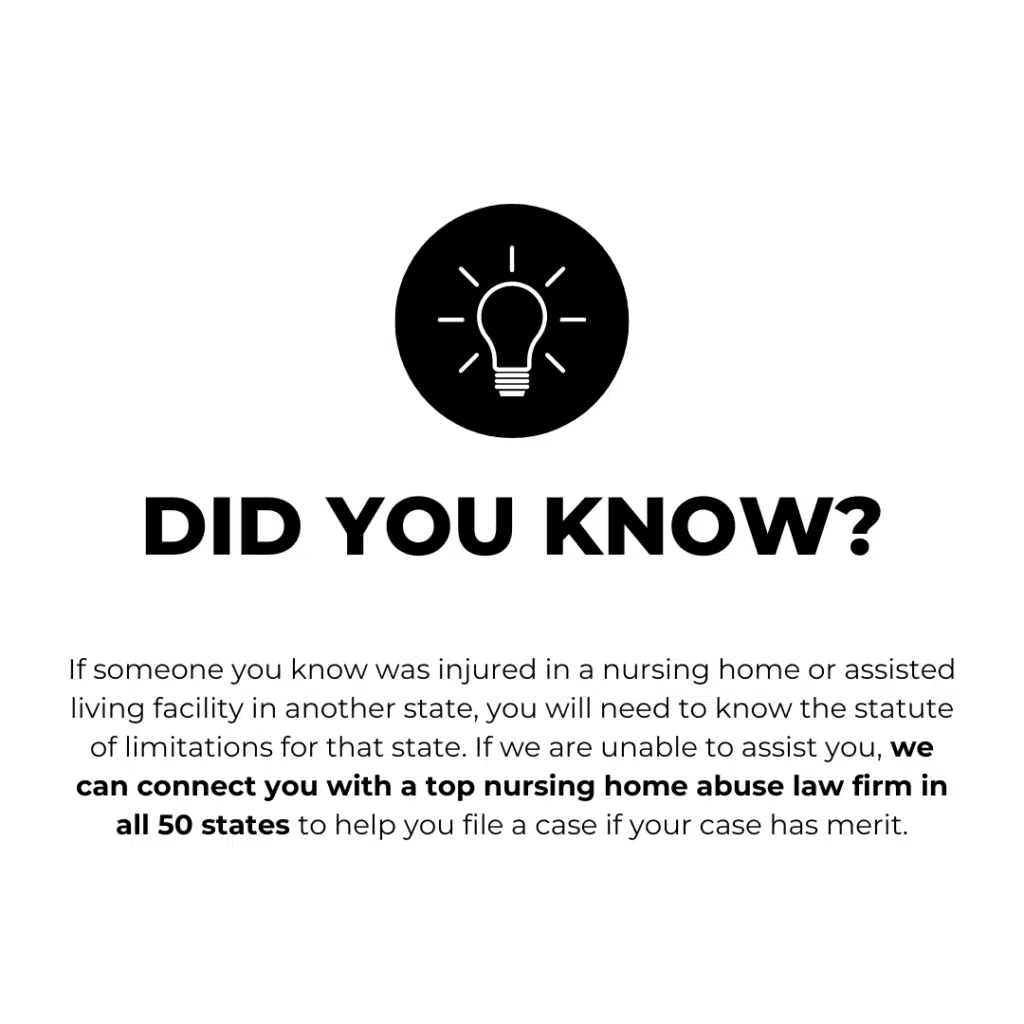
Nursing home abuse and neglect put vulnerable residents at serious risk, leading to malnutrition, dehydration, infections, and preventable injuries. When facilities fail to provide adequate care, residents suffer, and families are left feeling helpless. Lack of supervision, improper medical treatment, and unsafe conditions can result in devastating harm. Understanding the warning signs, knowing your legal rights, and holding negligent facilities accountable are crucial steps in protecting your loved ones. Learn how to take action and seek justice.
November 5, 2024
3 min
Nursing homes are entrusted with the care and well-being of our most vulnerable loved ones. Unfortunately, instances of neglect and abuse in these facilities are common. If you suspect that a family member has experienced abuse or neglect in a nursing home or assisted living facility, you need to understand your legal rights and the timeframe within which you can take action. The statute of limitations for filing a nursing home abuse lawsuit varies by state and is a critical factor in seeking justice and compensation for any harm inflicted.

A statute of limitation is a law that sets a time limit for filing a lawsuit. A nursing home negligence statute of limitations is essentially a legal time limit for filing a lawsuit for injuries that occur at a nursing home. These limits, established by state governments, dictate the duration within which individuals can file a lawsuit in cases of nursing home abuse or neglect.
These limitations vary from state to state, typically ranging from one to six years. They serve to ensure that individuals do not delay addressing issues while allowing sufficient time for evidence collection and legal action.

Statutes of limitations play a crucial role in the legal system by ensuring that legal actions are initiated promptly while also preserving fairness and efficiency.
One reason for statutes of limitations is to maintain the freshness of evidence. As time passes, it becomes increasingly challenging to gather evidence or recall specific details. Additionally, these rules promote fairness by creating a balanced legal environment for both plaintiffs and defendants. By setting deadlines, statutes of limitations prevent lawsuits from dragging on forever. This ensures that defendants, such as nursing homes, have a fair opportunity to defend themselves against allegations of negligence or wrongdoing. Statutes of limitations should give plaintiffs enough time to gather evidence and build their case.
However, in recent years, the balance of fairness has shifted in favor of nursing homes. State legislatures across the country, supported by money from large corporations, have attempted to limit the time frame that injured people have to file a lawsuit. This is simply an effort to prevent lawsuits from ever being filed. They have done this under the guise of “tort reform,” which is a political phrase created by big business to harm those people they have injured.
Typically, individuals who have suffered from nursing home abuse or neglect have at least one year to take legal action against the facility.
Understanding these statutes without legal assistance can be confusing. The legal language and requirements may be difficult to understand for individuals without legal expertise.
Statutes of limitations vary by state, which adds another layer of complexity. This variation can be particularly confusing for individuals who reside in a different state from where the harm occurred. Understanding the specific time limit for your case requires a level of expertise that the vast majority of people do not possess.
Statutes of limitations may change over time due to legislative amendments or court rulings. Staying updated on any changes to these laws is essential when considering legal action for nursing home negligence. Exceptions to the statutes may also apply in certain cases, further complicating matters. For instance, exceptions may be made if the defendant intentionally conceals evidence or if the injury resulting from the abuse only becomes apparent later.
Additionally, some states require that injured persons intending to file a lawsuit must provide specific notice to the potential defendants using special language or certain forms. Some states may restrict lawsuits against government-run assisted living facilities to within one year of the negligence occurrence while providing a different time for privately owned facilities.
Given these complexities, seeking the guidance of a knowledgeable nursing home lawyer is highly advisable. Experienced nursing home lawyers possess the expertise and understanding necessary to navigate the intricacies of statutes of limitations. They can provide valuable guidance, ensure that your case is filed within the relevant timeframes, and explore any exceptions that may apply to your specific situation.
For instance, in Florida, the standard statute of limitations for nursing home abuse cases is four years. However, if evidence or facts were concealed, an additional two years could potentially extend this limit. In Ohio, for example, the statute of limitations may not begin to run until the patient stops treating with caregivers for the specific injury at issue. Exceptions to these limitations might be applicable if:
These exceptions can differ from state to state. Consulting with a nursing home neglect attorney is typically the most effective way to determine whether any exceptions to the statute of limitations are relevant to your case.
Ensuring that you file your lawsuit before the nursing home negligence statute of limitations expires is crucial. It’s the key to making sure your family gets the justice and financial compensation they deserve. If you miss this deadline, you might lose the chance to take legal action altogether.
It’s important to understand a few key things about nursing home negligence statutes of limitations. Once the time limit is up, you might not be able to file your lawsuit anymore. So, time is of the essence. Getting help from a lawyer is important because they can make sure your case gets filed within the specific time limits set by your state.
If you’re not sure whether your case falls within the statutes of limitations for nursing home abuse, you can get a free consultation by calling (800) 659-2712.
Understanding the statute of limitations for filing a nursing home abuse lawsuit is crucial for seeking justice and compensation for your loved ones. These limitations vary by state and can range from one to six years, making it essential to seek legal assistance to navigate the complexities of these laws. Experienced nursing home lawyers play a vital role in ensuring that your case is filed within the relevant timeframe and exploring any exceptions that may apply. Therefore, seeking the guidance of a knowledgeable attorney is highly advisable to protect your rights and pursue legal recourse effectively. Don’t delay in seeking legal assistance if you suspect nursing home abuse or neglect, and take the necessary steps to seek justice for your loved ones.
Disclaimer: This information is provided for informational purposes only. Nothing in this article should be construed as providing legal advice or the creation of an attorney client relationship. Laws are updated frequently and change from state to state. If you desire legal advice, you can contact Michael Hill Trial Law at www.protectseniors.com, send an email to info@protectseniors.com, call (800) 659-2712 to begin an investigation or contact another attorney.